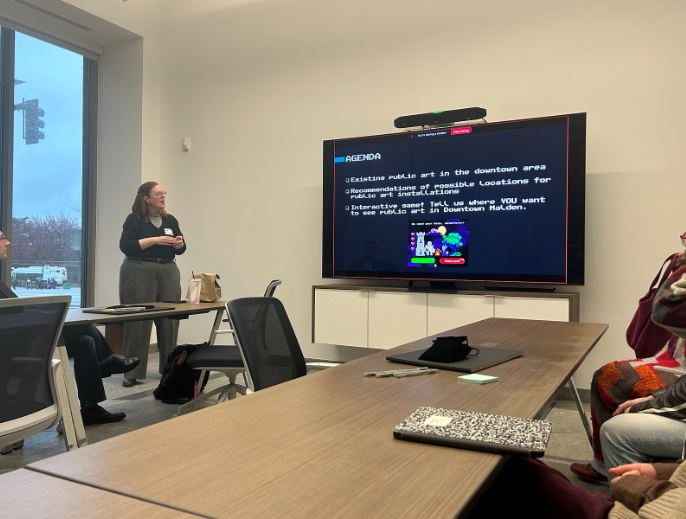Evelyn Ruan also contributed to this article.
As red, green, and yellow slips get distributed throughout Morning Meeting and the days until April vacation slip away, students have begun meeting with their guidance counselors to select their classes for the following school year. Faced with the daunting task of creating a schedule with the correct balance between challenging and manageable classes, students may need clarification on whether or not to enroll in Advanced Placement (AP) courses. Therefore, current AP students have shared their advice and expertise to assist prospective AP students in this difficult decision.
One subject that AP students have repeatedly recommended is AP English, some of the most commonly recommended courses being AP Seminar and AP Literature.
AP Seminar thrives to teach students how to form and present evidence-based arguments while encouraging collaboration and exploration of personal interests. This course becomes available for students to take during their sophomore year and allows students to hone their public speaking and reasoning skills.
This course can be very beneficial because it teaches students important skills that they will be able to use throughout the rest of their academic careers. “AP Seminar, I took my sophomore year, and whenever upcoming sophomores are asking me what class they should take I’ll always recommend AP Seminar. The main reason is that it’s not like any other class. When you’re in AP seminar it’s about teamwork, you’re working with other people and it’s the perfect sophomore class to take that will set you up for the rest of your years at MHS,” Senior Makeila Scott explained. “I’ve used AP Seminar in virtually every club and class that I’m in. It’s all about presentations which I very much like and it’s all about synthesizing arguments and you’re going to have to do that in every single one of your classes,” she shared.
The benefits of AP Seminar stretch beyond academics, proving to be valuable outside of the classroom. “If I were to recommend one, in terms of what I’ve gotten out of it, it would probably be AP Seminar. I think that class has been so useful in so many aspects of my life. It really just prepares you for anything like writing, speaking, reading hard-to-read texts; it was just a really good class to take,” junior Sophie LeBlanc elaborated. Though the class can be rewarding, prospective students should be considerate of the heightened workload it contains. “My schedule is really packed and I made the mistake of taking AP Seminar, which is an amazing course, but it is very time intensive so if you don’t have the time to take a very homework-heavy course like AP Seminar, don’t take it,” sophomore Lincoln Boswell expressed.
Similarly can be said for AP Literature, another recommended course that allows students to analyze and interpret various pieces of literature in a collaborative environment. Though the workload can be rigorous, students should not be deterred from trying the class. “I think I would recommend AP Lit, honestly both classes are very work intensive but AP Lit because of how good the class environment and dynamic is. I would love to take a class just like it again, and I would recommend it to anyone who is social and likes literature and books,” junior Beverly Tong remarked.
Junior Helen Xie agrees and describes the class as “very passionate when we read the books, and even though not every book may be everyone’s favorite, I feel like the teacher teaches it in a way where it’s allowing us to be interactive with each other and allows us to develop deeper thematic ideas about the book as well.”
However, such advanced courses come with equal academic responsibilities to keep up with the elevated workloads. Being able to manage one’s time properly is an essential component to succeed in any AP class. “As for considering the number of AP classes to take next year, they should evaluate the workload of each one of them and see if they will be able to balance it along with all of their extracurriculars. With the upcoming policy of dropping AP classes, this evaluation will need to happen before the next year, so definitely talk to the teacher and current or former students to make sure that this is the class that you really want and need to take,” junior Susila Wong thoroughly explained.
Students must be mindful of their extracurricular schedules when considering an AP course because they do not want to overbear themselves. “Balance your time, your time is the most important thing. If you want to do track, or outside programs, like any sports that are going to take up your time, try to balance your AP classes. your mental health will really start to deteriorate if you don’t have enough time to do everything and take a lot of time off resting because resting is really important,” Boswell stressed.
Though managing your time can be difficult, there are ways to get the help needed to succeed in AP classes. “Real advice I would give to stay on top of things is to advocate for yourself. A lot of times teachers will understand, especially AP teachers will understand, if something is burdening you or if something has become unrealistic and you need to take responsibility for yourself and advocate for what you need,” Scott added. On the same note, “I definitely have to manage my time properly and I always get help from my teachers and friends, or there’s always online resources that you can use,” junior Erica Lu agreed.
Procrastination is a very common factor that leads to poor time management. Junior Dante Federico shared how to combat this by “knowing what is ahead of me or due. I prioritize the dominating class and push aside other work to be proficient in that course’s content. Then, when my time frees up for that class, I shift my focus towards the others.”
Choosing a class that best fits you can be hard as there are a lot of things to consider. Especially AP classes where you have to decide what type of courses you would like to take, who else is taking the course, and how the class is run. Tong advised, “to take a rain check on who’s going to take a class because then you’ll know who’s going to be in the class with you and ask other people who are currently taking the course to give you a rundown on what actually happens in the class.”
Another important thing about AP course selections is knowing what you can and can’t do, as well as selecting a class you have an interest in. Many students agreed and stated that those two topics are very important. LeBlanc stated, “I would say just think about what you’re capable of. I would not recommend basing the classes you take based on other people’s opinions. Know your strengths, know your weaknesses, and know if you have a general sense of what you want to do after high school, base it around that. Also don’t underestimate them.” Sophie said that people around her told her that taking AP Environmental Science would be easy; despite her not being interested in a science class, she still took it. The results of her taking that class led to her struggling a lot more than her other classes. She mentioned that being mindful in knowing all AP classes will be difficult and that students should not just enroll because of peer pressure.
Juniors Merari Flores and Xie both said that knowing what you can and cannot do is also important. Flores emphasized, “Definitely know your limits. If you have questions about it, talk with your teacher about what the course load going to be because everybody is different and everybody has their limits. So for you to take an AP class, know your limits” Continuing Xie stated, “I think understanding and knowing what your limits are as a student and being able to balance that, is very important because, outside of school, you’re also a child and you’re still learning your new interests”
Scott agreed that sometimes, it is best not to listen to others and that students need to search on their own, “Advice I would give is to not listen to what other people tell you when you’re asking about AP classes, that’s what I did, that’s what other people do, and it would deter them from taking certain classes. it’s not about trusting the word of someone else blindly, but really about taking the time to search on your own for what is interesting to you. If I listened to what people said, I would have never taken AP Gov this year and it’s become one of my favorite classes.”
“Be real with yourself about what you want out of an AP class and there will be something for you,” LeBlanc commented.
Every teacher has a style of how they want to teach a class. Knowing that students should take note of what a teacher’s teaching style will be, to ensure that they understand and take in the information and get a good grade in that class.
Additionally, taking care of mental health is crucial. Not prioritizing such can lead to a decline in your mental health, which can affect your learning. Tong commented, “If you want to take an AP you have to like it, or have at least some interest in it, don’t take an AP just for the college credit unless you’re that dedicated to your school life because your social life will be gone.”
Students may be left wondering if it will be worth it to dedicate so much time and academic commitment to an AP course, and the value of taking an AP course can vary depending on what students plan to do in the future. Due to AP classes being created by the CollegeBoard, students have the opportunity to attain college credits by passing their end-of-the-year AP exams.
It is vital that if students are interested in obtaining college credits, they do their research on which AP courses can best benefit their academic futures. “This really also depends on what major or career path you will be taking, including the college that you want to go to. Do some research on whether there will be college credits given if you pass a certain threshold on the AP Exam. Of course, regardless of college, if you decide to take the class, grasp the information as much as you can, especially those skills that you will need to use in the future,” clarified Wong.
Taking at least one AP class is a good thing, it allows students to understand more about a topic, can challenge students based on knowledge, and some students may even take a class to particularly help their college applications and resumes look good. “I think that they are [worth it] but that’s because I like my classes and I do want the credit, especially for college. If you’re thinking of pursuing higher education I would definitely recommend you take them if you want to get into something prestigious.“ Tong clarified.
LeBlanc continued, “I feel like it depends on which ones you take and what you want to do. For example, if you want to be a doctor, it is going to be very helpful to take AP Chem and AP Bio. Those are things that most people get college credit for and are just going to prepare you for college.”
Even if the college credits are appealing, they are not the only thing students can get out of an AP class. These advanced courses allow students to academically challenge themselves and set themselves up for success for the rest of their high school careers. “I think it’s worth it because I feel like it really challenges me and teaches me a lot of skills that I wouldn’t really learn in honors or CP classes,” Lu mentioned.
But not everyone agrees that you should be taking a class just for the college credit and that your interests also matter as well. Xie stated, “I would recommend taking things that you think [you] would be interested in and not just for the college credit or to make your transcripts look good because it’s important to also contain a good mentality while trying to take AP classes.”




